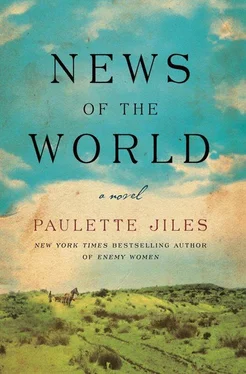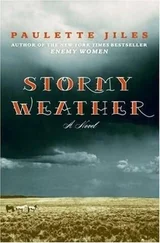They left the north-south road from the hill country to the San Antonio road and turned off to the west. They drove through a country now being sliced up by plows. Those plowing in the fields turned to look at the Curative Waters wagon and stared after them as they passed.
Castroville was a collection of stone houses with high-pitched roofs, some big square two-story ones with gallerias all around the second story, long windows, the women shaking out dust cloths and rugs from the balconies and powdering the heads of people on the street. It looked like all the engravings that the Captain had seen of European villages except for the cactus and the mesquite growing in yards. In their custom they lived in villages and then went out every day to work in their fields. The Captain had shed his canvas coat on the first day of April and now drove in gartered shirtsleeves and galluses. Down here in the flat land it was very warm and any wind was welcome. At least he had brought them through alive, the horses in good condition.
They passed the inn and gristmill where it sat on the Medina River among wild pecan trees. A seminary of the Order of Mary Immaculate took up an entire three acres and in every street abided the careful and precise pacing of life as it was lived in Alsace-Lorraine. The big warehouse of the Huth Seed Company was cavernous and dim with shade. Pasha tied behind called out to other horses but finally gave it up because there were now so many.
Captain Kidd was told that Wilhelm and Anna Leonberger lived fifteen miles farther on to the west, in a daughter community called D’Hanis. That the graves of the Leonberger couple and their little daughter were at St. Dominic’s church there. He did not tell anyone of Johanna’s captivity or her parents. They would come in crowds. They would come bearing cakes and pies and featherbeds. The little boys would whistle and the girls stare at her expressionless face and the adults would speak to her in the Alsatian dialect. As they drove on west beyond Castroville, on the dusty caliche road, the towering steeple and the roof of St. Dominic’s rose from the level horizon.
They stood before the graves. The Captain took off his hat and put it over his breast as he had been taught to do so long ago, the proper behavior. The girl looked at the headstones and their weeping angels with some curiosity, mostly indifference, and then turned to look all around herself at a country tamed and torn with plows and weighted down with stone buildings.
We go back Dallas? she said. I don’t like here. She was composed and quiet and she would try one last time. I don’t like here, pliss Kep-dun, pliss.
We can’t, my dear. He stepped into the driver’s seat and took up the reins. We just cannot.
Still she stood by the grave and then lifted her head to the flat countryside. A woodenness came over her. A Kiowa’s first and last resort was courage. A Kiowa did not beg or plead or appease. She knew at the bitter end she could starve away the despair, deny any sustenance to surrender. She wiped her face again and climbed up into the wagon. Ausay gya kii, gyao boi tol. Prepare for a hard winter, prepare for hard times. She braided her hair as if for battle. And so she became quiet and stilled.
They rode on in silence, through the bright, dry landscape and through the hot afternoon hours, click click click.
The Captain stopped a man on horseback.
He said, Sir, I would be grateful if you would do me a favor. I would be willing to pay you whatever you ask.
And what would that be?
The man sat his horse easily as it turned and twisted. The man wore a white shirt and dark vest with his wool suit coat tied behind the saddle. He regarded the Captain, a distinguished-looking man, clearly an Amerikaner , in a wagon with gold lettering and bullet holes.
The Captain said, Give me directions to Wilhelm and Anna Leonberger’s farm and then ride on ahead of me and give them the message that Johanna Leonberger, who is the daughter of Jan and Greta, missing these four years, is come from captivity among the Kiowas.
For a moment the man stared at him and then at Johanna. She looked back at him with eyes blue and hard as delft.
Then he cried out, God be praised!
The man shouted this out to the sky and without another word he turned his horse and went galloping away down the road and the last the Captain saw of him he had turned south, beyond St. Dominic’s. Springtime birds shot up out of the tall grass and to his right lay that long blue serrated line of the hills they had just left, distant and somehow safe.
THEY CAME DOWN a long straight road that led to the Leonberger farm. He got down first and held out his hand to Johanna. The girl had become blank again, blank as bone. Without moving her head she turned her eyes to look at her relatives’ farm. The stone house with its long front porch running the length of the building, the sort of porch Texans called a galleria, a paling fence, chickens, farm tools, a barn, mesquite trees, dogs, the blazing sun. The man the Captain had sent ahead stood smiling and holding his horse’s reins. He was staring at Johanna. Nobody said anything. Dogs came to surround them and terrify them with barking.
Raus! Raus! A man came out and beat the dogs off with a riding quirt. Johanna’s head snapped up at the sound of the German language and then, as if they had just appeared, looked from right to left at the farmhouse and the outbuildings and the broad sweep of the south brush country with the mesquite beaten back to the field edges and the flowering huisache, the tall candelabra of yucca blooms, thick and fleshy and white. Tante , she whispered. Onkle.
Captain Kidd took off his hat. He said, I am Jefferson Kyle Kidd, and I have returned your niece, Johanna. She was ransomed by Indian Agent Samuel Hammond at Fort Sill, Indian Territory.
He handed over the papers and stood in silence as if in a winter blizzard. His throat hurt. He was tired. His eyebrow hurt and the sharp pains had begun to creep around on his skull. His hands looked as bony and wrinkled as those of a catacomb mummy. Johanna crossed the driver’s seat to drop down beside him on the ground.
Anna Leonberger came out to stand beside her husband. Captain Kidd waited for another interminable few seconds while the man read the papers. The Captain said, finally, I have brought her all the way from Wichita Falls on the Red River.
Ja , yes, is what Adolph says. Wilhelm Leonberger motioned with one hand toward the messenger without looking up. He was still making his way through the paper. He was a slight blond man with a tanned face in brown planes. He turned to look at Adolph and then back to the Captain. He said, We send up fifty dollar in gold.
Yes, said Captain Kidd. I bought this wagon with it.
Wilhelm looked at it and the gold lettering, Curative Waters, and the bullet holes. He said, And the harness too?
Yes.
You have receipt?
No, said Captain Kidd. I do not.
Wilhelm regarded Johanna. She stood with one hand on Fancy’s harness, barefooted, her shoes tied around her neck, and she was gripping the back band so tightly her knuckles were white. Her hair was braided up and around her head. Her dress skirts in madder and yellow carriage check lifted and fell in the flatland wind.
Wilhelm said, Her parents were done murder by the Indians.
I heard that, said the Captain. Yes. A tragedy.
The man who had served as messenger had an anxious look on his face. He said something loud and cheerful in Alsatian and then lifted his shoulders to the Captain. We are not all like this, the shrug said.
All right, vell then, come in, I suppose.
The messenger bit his lip in dismay and hesitated and then mounted and rode away.
Читать дальше












